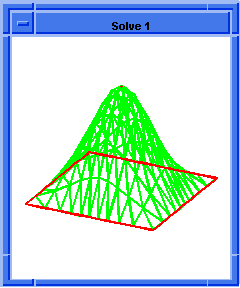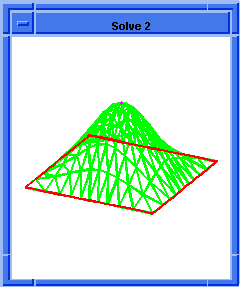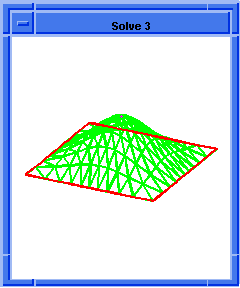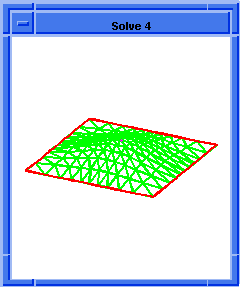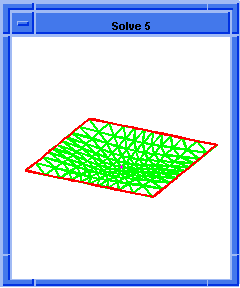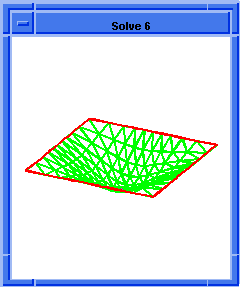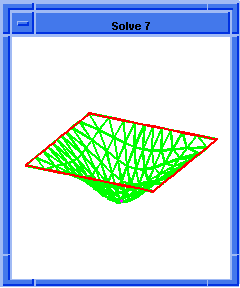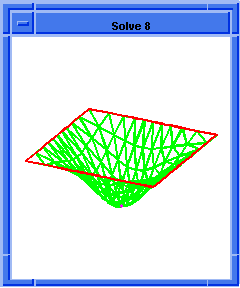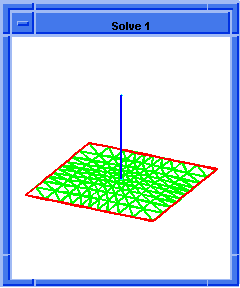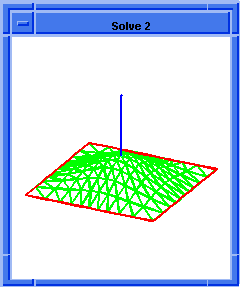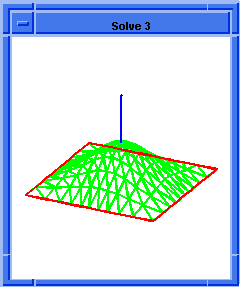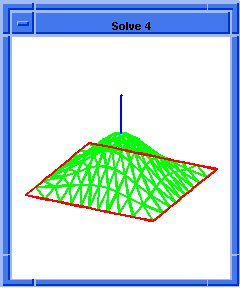Scheme Extensions ds:d* thru ds:i* |
|
|
|
Technical Article |
| Scheme is a public domain programming language, based on the LISP language,
that uses an interpreter to run commands. ACIS provides extensions (written
in C++) to the native Scheme language that can be used by an application
to interact with ACIS through its Scheme Interpreter. The C++ source files
for ACIS Scheme extensions are provided with the product. Spatials Scheme
based demonstration application, Scheme ACIS Interface Driver Extension
(Scheme AIDE), also uses these Scheme extensions and the Scheme Interpreter.
|
ds:debug
- Action
-
Prints parameters of a deformable model.
Filename-
scm/scmext/ds/dsscm.cpp
APIs-
api_dm_get_attrib_dm2acis
Syntax-
(ds:debug owner [target=1])
Arg Types-
Returns-
unspecified
Description
Prints a report of the target deformable model parameters belonging to
the owner.
- The target argument specifies
which deformable model to use in a patch hierarchy. Valid values for target are:
-
1 =
active deformable model
-
2 =
root deformable model
-
-1 = active deformable model and offspring
-
-2 = root deformable model and offspring
-
Otherwise, the target is the deformable model whose tag identifier
equals target.
- Arguments
-
owner is an ACIS face or edge
on which the deformable model lives.
-
target specifies which deformable model
to use in a patch hierarchy.
; ds:debug
; Print parameters of a deformable surface model.
; Build a test square spline face.
; (6x6 control points, x and y side length = 36)
(define dsmodel1 (ds:test-face 6 6 36 36 0))
;; dsmodel1
; Output its parameters
(ds:debug dsmodel1 1)
; Output to stdout
;; Rendering Facets[nu nv]
: [10, 10] ok
;; tag_object_count
: [4]
;; control_pt_count
: [36]
;; domain_dim,image_dim
: [2, 3]
;; has domain changed since commit?: 0
;; (0=no,1=yes)
;; stretch_parameters [a11 a12 a22]: [1.00 0.00 1.00]
;; bending_parameters [b11 b12 b22]: [5.00 0.00 5.00]
;; displacement_param [d
]: [0.00]
;; time_integration [dt mass damp] : [1.00 1.00 5.00]
;; spatial_integration [ntgrl_degree] : [8]
;; [number_of_loads, number_of_cstrns]: [0 4]
;; ends(0=open,1=closed,2=tang) [u v] : [0 0]
;; poles(0=no,1=lo,2=hi,3=both) [u v] : [0 0]
;; abcd_state [rebuild/solve A B C D] :[A(1 0)
;; b(1 0) C(1 0) d(1 0)]
;; abcd_state [dyn_terms init_x]: Dyn terms(1)
;; Init_x(0)
;; sym_eq degree_of_freedom counts :
;; Total_system_dofs
: n = 36
;; Total_constraint_equation_count: q = 0
;; Free_system_dofs
: p = 36
;; Independent_Constraint_Count
: m = 0
;; Basis-Degrees [Basis_u,Basis_v] : [3, 3]
; ; Knot-counts [Basis_u,Basis_v] : [4, 4]
;; Basis_u knots ([mult] = val) : [3] = 0.000000
;;
: [1] = 0.333333
;;
: [1] = 0.666667
;;
: [3] = 1.000000
;; Basis_v knots ([mult] = val) : [3] = 0.000000
;;
: [1] = 0.333333
;;
: [1] = 0.666667
;;
: [3] = 1.000000
;; () |
[Top]
ds:elevate-degree
- Action
-
Increases the polynomial degree of a deformable models basis functions.
Filename-
scm/scmext/ds/dsscm.cpp
APIs-
api_dm_get_attrib_dm2acis
Syntax-
(ds:elevate-degree owner [target=1] [continuity-flag=0])
Arg Types-
Returns-
unspecified
Description
Increments by one the degree of the basis functions of the target deformable
model belonging to owner.
- The target argument specifies
which deformable model to use in a patch hierarchy. Valid values for target are:
-
1 =
active deformable model
-
2 =
root deformable model
-
-1 = active deformable model and offspring
-
-2 = root deformable model and offspring
-
Otherwise, the target is the deformable model whose tag identifier
equals target.
The continuity-flag specifies
if the element-to-element continuity level is to be preserved or changed
when the element degree is incremented. Higher degree elements can support
higher element-to-element continuity. When continuity-flag
is 0, the inter-element continuity is preserved. When continuity-flag
is 1, the inter-element continuity is increased.
Only when continuity-flag is
0 and inter-element continuity is preserved can the returned shape exactly
equal the input shape. Changing the inter-element continuity will change
the shape by a small amount, which may be surprisingly large for some
cases of NURB (or NUB) curves and surfaces.
When continuity-flag is 1,
one degree of freedom (dof) is added to each axis of the surface. So a
6x6 control point surface will become a 7x7 control point surface. So
if a bi-cubic 6x6 control point surface initially composed of an array
of 3x3 elements is used as input, then the modified surface is a 9x9 control
point surface.
- Arguments
-
owner ACIS face or edge on
which the deformable model lives.
-
target specifies which deformable model
to use in a patch hierarchy.
-
continuity-flag specifies if the element-to-element
continuity level is to be preserved or changed when the element degree
is incremented.
; ds:elevate-degree
; Create a low-order B-spline face and use this
; function to increase the order of its deformable
; model. Make a low-order test face.
; (4x4 control points, x and y side length = 36)
(define dsmodel1 (ds:test-face 6 6 36 36 0))
;; dsmodel1
(define erase (entity:erase dsmodel1))
;; erase
(define drawstate (ds:set-draw-state dsmodel1 2
ds-draw-cpts))
;; drawstate
; The face should only have 4 (2x2) control points.
; Increase the basis polynomial degree to 3.
(ds:elevate-degree dsmodel1 2)
;; ()
(ds:get-shape-dofs dsmodel1)
;; (81 9 9 (1.73686342001475e-013
; -8.49755921010498e-01
; .
; . (entire return is displayed in Scheme window)
; .
;; 000000000041 ...))
(ds:elevate-degree dsmodel1 2)
;; ()
; The face now has 16 (4x4) control points.
; Use ds:debug to examine the changes. |
[Top]
ds:end-sculpting
- Action
-
Removes and deletes the nonpersistent deformable surface model from
an entity.
Filename-
scm/scmext/ds/dsscm.cpp
APIs-
api_dm_get_attrib_dm2acis, api_dm_remove_attrib_dm2acis
Syntax-
(ds:end-sculpting owner)
Arg Types-
Returns-
unspecified
Description
Removes and deletes the nonpersistent version of the specified deformable
surface model. This command does not change the owners geometry or update
its persistent version of the deformable model.
- Arguments
-
owner is an ACIS face or edge
on which the deformable model lives.
; ds:end-sculpting
; Make a test face.
; (6x6 control points, x and y side length = 36)
(define dsmodel1 (ds:test-face 6 6 36 36 0))
;; dsmodel1
; Dont display entity / ds test face exists.
(define erase (entity:erase dsmodel1))
;; erase
; Render the loads and constraints.
(ds:set-draw-state dsmodel1 1
(+ ds-draw-cstrns ds-draw-loads))
;; ()
; Force the construction of a deformable model by
; running any DS extensions on the face.
(ds:set-draw-state dsmodel1 1
(+ ds-draw-cstrns ds-draw-loads))
;; ()
; The deformable face renders.
; Remove the deformable model.
(ds:end-sculpting dsmodel1)
;; ()
(view:refresh)
;; #[view 1076131480]
; The deformable model no longer renders. |
[Top]
ds:extrapolate
- Action
-
Expands the owners deformable mode by 5% in all possible directions.
Filename-
scm/scmext/ds/dsscm.cpp
APIs-
api_dm_get_attrib_dm2acis
Syntax-
(ds:extrapolate owner target=1)
Arg Types-
Returns-
unspecified
Description
Extends the domain of the target deformable model by 5% in all possible
directions.
- The target argument specifies
which deformable model to use in a patch hierarchy. Valid values for target are:
-
1 =
active deformable model
-
2 =
root deformable model
-
-1 = active deformable model and offspring
-
-2 = root deformable model and offspring
-
Otherwise, the target is the deformable model whose tag identifier
equals target.
This extension recalculates the control point locations so that the
original portion of the surface maintains its current shape. Faces with
closed, periodic, or singular edges cannot be extended in those directions
but are extended in directions across edges which are not so constrained.
A deformable model within a multi-surface mesh will not be extrapolated.
Trying to do so will not change the database in any manner and result
in signaling the system error DM_MULTI_SURF_EXTRAPOLATE.
- Arguments
-
owner is an ACIS face or edge
on which the deformable model lives.
-
target specifies which deformable model
to use in a patch hierarchy.
Limitations-
Cannot extrapolate a deformable model within a multi-surface mesh.
; ds:extrapolate
; Extends the domain of the surface by 5% in each
; possible direction.
; Build a test square spline face.
; (6x6 control points, x and y side length = 36)
(define dsmodel1 (ds:test-face 6 6 36 36 0))
;; dsmodel1
; Dont display entity / ds test face exists.
(define erase (entity:erase dsmodel1))
;; erase
; Render the loads and constraints.
(ds:set-draw-state dsmodel1 1
(+ ds-draw-cstrns ds-draw-loads))
;; ()
; Add a pt-cstrn at the center and track it.
(define cc1 (ds:add-pt-cstrn dsmodel1
1 "position" (par-pos 0.5 0.5)))
;; cc1
(ds:set-pt-xyz dsmodel1 cc1 0
(position 18 18 35))
;; 8
; Compute a new deformable model position.
(ds:solve dsmodel1 1 1)
;; ()
; OUTPUT Original
; Extrapolate the surface by 5%.
(ds:extrapolate dsmodel1 1)
;; ()
(ds:solve dsmodel1 1 1)
;; ()
; The shape remains the same.
; OUTPUT Result
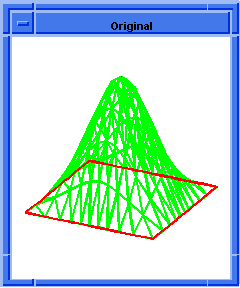  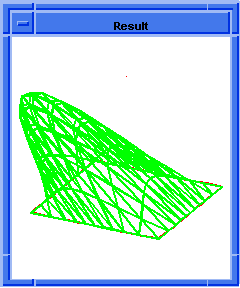
Figure.
ds:extrapolate |
[Top]
ds:gen-path
- Action
-
Creates a list of sampled positions and time stamp for each position
taken from the trajectory of a flying particle.
Filename-
scm/scmext/ds/dsscm.cpp
APIs-
None
Syntax-
(ds:gen-path [start-time=0 stop-time=3600 store-count=121
integration-count=3])
Arg Types-
Returns-
integer
Description
Creates a list of regularly sampled positions generated through a time
integration of the equations of motion for a powered particle. This function
is only a convenience for making test-cases to be used in the construction
of deformable curve spring-set loads.
start-time is the starting
time in seconds (default 0.0). stop-time
is the stop time in seconds (default 3600). store-count
is the stored time step count; The default is 121. integration-count
is the integration steps per store; The default is 3.
This returns a list consisting of an integer for the point count, a
list of time values, and a list of positions.
- Arguments
-
start-time is the starting
time in seconds.
-
stop-time is the stop time in seconds.
-
store-count is the stored time step
count.
-
integration-count is the integration
steps per store.
; ds:gen-path
; Use a set of point locations defined by the
; function (ds:gen-path) to mold the shape of
; of a deformable curve with a spring-set load.
; Use ds:gen-path to make positions and time samples.
(define samp-pts1 (ds:gen-path 0 650 121 3))
;; samp-pts1
; Build a deformable curve.
(define dsmodel1
(ds:test-edge 25 36 0 0 3 0.0 0.0 650))
;; dsmodel1
; Dont display entity / ds test face exists.
(define erase (entity:erase dsmodel1))
;; erase
; Add a spring set to the deformable curve
; domain-points list, position points list,
; gain.
(define spr1 (ds:add-spring-set dsmodel1 1
(cadr samp-pts1) (caddr samp-pts1) 100))
;; spr1
; Toggle the end point constraints off so the ends
; can move to the sampled data.
(ds:toggle-cstrn dsmodel1 1)
;; 0
(ds:toggle-cstrn dsmodel1 2)
;; 0
; Clear the deformable curves default shape.
(ds:set-default-shape dsmodel1 1 0)
;; ()
; Render cstrns, loads, curvature combs, elements.
(ds:set-draw-state dsmodel1 1
(+ ds-draw-cstrns ds-draw-loads
ds-draw-curve-comb ds-draw-elems))
;; ()
(ds:set-comb-graphics dsmodel1 1 25 -100)
;; ()
(ds:set-icon-radius dsmodel1 3)
;; ()
; call (ds:solve) so that data may sculpt curve.
(ds:solve dsmodel1 1 1)
;; ()
; Capture the shape without the data points using
; the default shape feature.
(ds:set-default-shape dsmodel1 1 1)
;; ()
(ds:rm-tag-object dsmodel1 spr1)
;; 5
(ds:set-draw-state dsmodel1 1
(+ ds-draw-cstrns ds-draw-loads
ds-draw-curve-comb))
;; ()
(ds:solve dsmodel1 1 1)
;; ()
; Captured curve shape is drawn with curvature comb. |
[Top]
ds:get-active-patch
- Action
-
Gets the tag identifier number of the currently active patch within
the patch hierarchy of the given deformable model.
Filename-
scm/scmext/ds/dsscm.cpp
APIs-
api_dm_get_attrib_dm2acis
Syntax-
(ds:get-active-patch owner)
Arg Types-
Returns-
integer
Description
Returns the tag identifier number for the active patch within the deformable
model patch hierarchy associated with the input owner.
Making the query on an owner without a deformable model causes a deformable
model to be added to the entity and a tag identifier value is returned.
- Arguments
-
owner is an ACIS face or edge
on which the deformable model lives.
; ds:get-active-patch
; Add to a square test face a parabolic crv-load
; and use it.
; Build a test square spline face.
; (6x6 control points, x and y side length = 36)
(define dsmodel1 (ds:test-face 6 6 36 36 0))
;; dsmodel1
; Dont display entity / ds test face exists
(define erase (entity:erase dsmodel1))
;; erase
; Render the loads and constraints.
(ds:set-draw-state dsmodel1 1
(+ ds-draw-cstrns ds-draw-loads))
;; ()
; Add a pt-cstrn at the center of the parent and
; track it.
(define cc1 (ds:add-pt-cstrn dsmodel1
1 "position" (par-pos 0.5 0.5)))
;; cc1
(ds:set-pt-xyz dsmodel1 cc1 0
(position 18 18 10))
;; 8
; Compute a new deformable model position
(ds:solve dsmodel1 1 1)
;; ()
; Add a patch to the parent shape.
; The new patch becomes the active shape.
(define patch1 (ds:add-patch dsmodel1 1 1
(par-pos 0.3 0.3) (par-pos 0.5 0.5)
(par-pos 0.7 0.7) 3))
;; patch1
; Add and track a pt-cstrn on the patch.
(define cc2 (ds:add-pt-cstrn dsmodel1
1 "position" (par-pos 0.5 0.5)))
;; cc2
(ds:set-pt-xyz dsmodel1 cc2 0
(position 18 18 36))
;; 8
; Compute a new deformable model position
(ds:solve dsmodel1 1 -3)
;; ()
; Find the tag identifier value of the
active patch
(ds:get-active-patch dsmodel1)
;; 8 |
[Top]
ds:get-alpha
- Action
-
Gets a list of (au, av, atheta) for deformable surfaces and a list
of (au) for deformable curves.
Filename-
scm/scmext/ds/dsscm.cpp
APIs-
api_dm_get_attrib_dm2acis
Syntax-
(ds:get-alpha owner [target=1])
Arg Types-
Returns-
(real ...)
Description
Returns a list of (au, av, atheta) surfaces and a list of (au) for deformable
curves. These are the owner and
target resistance to stretch
parameters.
au is the resistance to stretch in the parametric u direction
and av is the resistance to stretch in the parametric v direction.
When au = av, the surface has homogeneous properties. The resistance to
shape is the same in all parametric directions. When au is not equal to
av, the inhomogeneous material property behavior is rotated within the
surface by the angle, atheta, given in degrees.
- The target argument specifies
which deformable model to use in a patch hierarchy. Valid values for target are:
-
1 =
active deformable model
-
2 =
root deformable model
-
-1 = active deformable model and offspring
-
-2 = root deformable model and offspring
-
Otherwise, the target is the deformable model whose tag identifier
equals target.
- Arguments
-
owner is an ACIS face
or edge on which the deformable model lives.
-
target specifies which deformable model
to use in a patch hierarchy.
; ds:get-alpha
; Build a test square spline face.
; (6x6 control points, x and y side length = 36)
(define dsmodel1 (ds:test-face 6 6 36 36 0))
;; dsmodel1
; Dont display entity / ds test face exists.
(define erase (entity:erase dsmodel1))
;; erase
; Render the loads and constraints.
(ds:set-draw-state dsmodel1 1
(+ ds-draw-cstrns ds-draw-loads))
;; ()
; Ensure that the dof state is current.
(ds:solve dsmodel1 1)
;; ()
; Get the alpha state for the surface.
(ds:get-alpha dsmodel1 1)
;; (1 1 0) |
[Top]
ds:get-beta
- Action
-
Gets a list of (bu, bv, btheta) for deformable surfaces and returns
a list of (bu) for deformable curves.
Filename-
scm/scmext/ds/dsscm.cpp
APIs-
api_dm_get_attrib_dm2acis
Syntax-
(ds:get-beta owner [target=1])
Arg Types-
Returns-
(real ...)
Description
Returns a list of (bu, bv, btheta) for deformable surfaces and returns
a list of (bu) for deformable curves. These are the owners target deformable
models resistance to bending parameters.
- The target argument specifies
which deformable model to use in a patch hierarchy. Valid values for target are:
-
1 =
active deformable model
-
2 =
root deformable model
-
-1 = active deformable model and offspring
-
-2 = root deformable model and offspring
-
Otherwise, the target is the deformable model whose tag identifier
equals target.
In deformable surfaces, bu is the resistance to stretch in the parametric
u direction and bv is the resistance to stretch in the parametric
v direction. When bu equals bv, the surface has homogeneous properties.
The resistance to shape is the same in all parametric directions. When
bu does not equal bv the surfaces inhomogeneous material property behavior
is rotated within the surface by the angle, btheta, given in degrees.
- Arguments
-
owner ACIS face or edge on
which the deformable model lives.
-
target specifies which deformable model
to use in a patch hierarchy.
; ds:get-beta
; Build a test square spline face.
; (6x6 control points, x and y side length = 36)
(define dsmodel1 (ds:test-face 6 6 36 36 0))
;; dsmodel1
; Dont display entity / ds test face exists.
(define erase (entity:erase dsmodel1))
;; erase
; Render the loads and constraints.
(ds:set-draw-state dsmodel1 1
(+ ds-draw-cstrns ds-draw-loads))
;; ()
; Ensure the dof state is current.
(ds:solve dsmodel1 1)
;; ()
; Get the beta state for the surface.
(ds:get-beta dsmodel1 1)
;; (5 5 0) |
[Top]
ds:get-child-tag
- Action
-
Returns the tag number of the target deformable models child or -1
for none.
Filename-
scm/scmext/ds/dsscm.cpp
APIs-
api_dm_get_attrib_dm2acis
Syntax-
(ds:get-child-tag owner [target=1])
Arg Types-
Returns-
integer
Description
Returns the tag identifier for the target deformable models child or -1
for none.
- The target argument specifies
which deformable model to use in a patch hierarchy. Valid values for target are:
-
1 = active deformable model
-
2 = root deformable model
-
Otherwise, the target is the deformable model whose tag identifier
equals target.
- Arguments
-
owner is an ACIS face or edge
on which the deformable model lives.
-
target specifies which deformable model
to use in a patch hierarchy.
; ds:get-child-tag
; Build a test square spline face.
; (6x6 control points, x and y side length = 36)
(define dsmodel1 (ds:test-face 6 6 36 36 0))
;; dsmodel1
; Dont display entity / ds test face exists
(define erase (entity:erase dsmodel1))
;; erase
; Render the loads and constraints.
(ds:set-draw-state dsmodel1 1
(+ ds-draw-cstrns ds-draw-loads))
;; ()
; Add two rectangular patches to the child shape.
; The new patch becomes the active shape.
(define patch1 (ds:add-patch dsmodel1 2 1
(par-pos 0.1 0.1) (par-pos 0.3 0.3)
(par-pos 0.5 0.5) 3))
;; patch1
(define patch2 (ds:add-patch dsmodel1 2 1
(par-pos 0.7 0.7) (par-pos 0.8 0.8)
(par-pos 0.9 0.9) 3))
;; patch2
; exercise ds:get-child-tag
(ds:get-child-tag dsmodel1 2)
;; 7 |
[Top]
ds:get-comb-graphics
- Action
-
Gets the number of points and the gain used in the rendering of a curvature
comb graphical report for a deformable model.
Filename-
scm/scmext/ds/dsscm.cpp
APIs-
api_dm_get_attrib_dm2acis
Syntax-
(ds:get-comb-graphics owner [target=1])
Arg Types-
Returns-
((integer . real) ...)
Description
Gets the number of points and scaling gain used in the graphical parameter
space curvature comb report for a target deformable model.
- The target argument specifies
which deformable model to use in a patch hierarchy. Valid values for target are:
-
1 =
active deformable model
-
2 =
root deformable model
-
-1 = active deformable model and offspring
-
-2 = root deformable model and offspring
-
Otherwise, the target is the deformable model whose tag identifier
equals target.
Curvature combs are a graphical representation of the parameter space
curvature properties of the curve constraints. A curvature comb is made
up of a set of vectors drawn from the curve in the direction of principal
curvature. The magnitude of the vector is the curvature. These combs are
then projected through the deformable surface shape into three dimensional
space for rendering which tends to distort them as the surface is manipulated.
The number of vectors drawn per element is specified by elem_pt_count.
gain is an additional gain factor
used to scale the curvature comb for viewing convenience.
- Arguments
-
owner is an ACIS face
or edge on which the deformable model lives.
-
target specifies which deformable model
to use in a patch hierarchy.
; ds:get-comb-graphics
; Build a test square face with some tag objects
; (6x6 control points, x and y side length = 36)
(define dsmodel1 (ds:test-face 6 6 36 36 0))
;; dsmodel1
; Dont display entity / ds test face exists.
(define erase (entity:erase dsmodel1))
;; erase
; Render the loads and constraints.
(ds:set-draw-state dsmodel1 1
(+ ds-draw-cstrns ds-draw-loads))
;; ()
; Replace the default edge constraints with a circle
; constraint.
(ds:toggle-cstrn dsmodel1 1)
;; 0
(ds:toggle-cstrn dsmodel1 2)
;; 0
(ds:toggle-cstrn dsmodel1 3)
;; 6
(ds:toggle-cstrn dsmodel1 4)
;; 6
(ds:add-circ-cstrn dsmodel1 1 "position"
(par-pos 0.5 0.5) (par-pos 0 0.3)
(par-pos 0.3 0))
;; 7
; Render the loads, constraints, and the
; curvature reports.
(ds:get-draw-state dsmodel1 1)
;; 12
; Adjust the curvature plot graphics
; to draw the comb pointing to the convex side.
(ds:set-comb-graphics dsmodel1 1 20 -1.0)
;; ()
; Retrieve the curvature plot graphical parameters.
(ds:get-comb-graphics dsmodel1 1)
;; (20 -1) |
[Top]
ds:get-cstrn
- Action
-
Gets the defining data, current behavior, and current state of a deformable
model constraint.
Filename-
scm/scmext/ds/dsscm.cpp
APIs-
api_dm_get_attrib_dm2acis
Syntax-
(ds:get-cstrn owner tag)
Arg Types-
Returns-
string | string ...
Description
This extension retrieves all defining and current status data for an existing
constraint in a deformable model. The input owner
argument identifies the face or edge being sculpted. The tag
identifier specifies which constraint to query. When the tag
identifier recognizes a constraint, the deformable model in the patch
hierarchy which contains the constraint is made the active deformable
model. The constraint data is organized and returned as a list whose member
order and allowed values are described below. The list of return items
includes:
( patch1_tag
patch2_tag
behavior_string
state_string
rights_string
shape1_string
(par_pos list)
shape2_string
(par_pos list)
tangent_gain_value
integral_degree_accuracy
)
patch2_tag is the tag identifier
of the patch that contains given tag
object or -1 when the input tag
does not identify a valid tag object.
behavior_string specifies how the constraint constrains the position
and/or the cross-tangent. The behavior strings are the same for point
and curve constraints, but different for link constraints. For point and
curve constraints, the output is a combination of the strings, position,
tangent, and curvature. The presence on any string specifies the properties
being constrained by the constraint. The behavior string for a link constraint
reports the position and the cross tangent state for each curve in the
following form:
pos_crv1_pos_crv2_pos_tan_crv1_tan_crv2_tan
The crv_behavior strings are one of: link, fix, or off. Where link means
the two curves are tracking one another, fix means the curve is fixed
and acting like a curve constraint, and off means the curve is unconstrained
and off to deform as desired. Typical link behavior strings will be pos_link_link_tan_off_off,
for a C0 link constraint, pos_link_link_tan_link_link for a C1 link constraint,
and pos_fix_fix_tan_link_link for a C1 link constraint where the surface
is only off to rotate about the constraints own axis.
| pos_link_link_tan_off_off |
for a C0 link constraint |
| pos_link_link_tan_link_link |
for a C1 link constraint and |
| pos_fix_fix_tan_link_link |
for a C1 link constraint where the surface is only able to rotate about
the constraints own axis. |
state_string specifies whether the constraint is currently on or off.
The state argument is a string whose value is either on or off.
- rights_string specifies whether the constraint may be turned off
and whether the constraint may be deleted by the user interface. For example,
constraints preserving boundary shapes to fit into solid models which
cannot be deleted or stopped are immutable. The valid values for rights
are:
-
deletable
-
stopable
-
delete_stopable
-
immutable
-
shape string specifies which loci of points in the deformable model
are constrained. The supported constraints include point constraints and
curve constraints in the form of straights, parabolas, circ, and general
pcurves. A circ may be used for either an ellipse or a circle. The valid
values for shape are:
-
point
-
straight
-
parabola
-
circ
-
curve
-
area
The par-pos lists are one or more par_pos point locations that parameterize
a shape. Each par_pos location specifies a point in the domain space of
the deformable model. The coordinates of any par-pos point are scaled
to the range of 0.0 to 1.0. Different shapes contain different numbers
of par-pos point positions as follows:
| Shape |
uv_pts Count |
uv_pts Description |
| straight |
2 |
has two par-pos positions: Begin uv point and end uv
point. |
| parabola |
3 |
has three par-pos positions: Begin uv point, tangent intersection
point, and end uv point. |
| circ |
3 |
has three par-pos positions: Center uv point, a axis
end uv point, and b axis end uv point. |
| area |
2 |
has two par-pos positions: lower-left and upper-right corners of a
rectangle area. Currently, all areas are limited to simple rectangles. |
| tag |
0 |
has no par-pos positions. The shape is taken from an existing load
and the load is deleted. |
circ is a closed elliptical arc defined by a center point (uv_ctr),
and two vectors (uv_a and uv_b) which mark the distance
between the center point and two points on the ellipse. The shape of the
curve in domain space is given by:
C (theta) = uv_ctr +
uv_a*cos(theta)
+ uv_b*sin(theta)
When the a and b vectors have the same lengths the circ
is a circle centered on the given center point. A well paramaterized circ
is best built when the a and b vectors are orthogonal to
one another. For example:
uv_ctr= [.5,.5], uv_a
= [.2,0], uv_b = [0,.2]
tangent_gain_value is a scaling value for the tangent vectors constrained
in a curves tangent constraint.
integral_degree_accuracy specifies the accuracy of numerical integration
used within each element. (A polynomial function of degree integral_degree_accuracy
will be integrated exactly.) An integral_degree_accuracy value that is
too large increases the computation cost and reduces the error, but an
integral degree value that is too small yields bad results. The integral
degree value is selected automatically by the deformable modeling library.
For the constraints which do not use integral_degree_accuracy, point-constraints,
and area-constraints, set values to -1.
- Arguments
-
owner is an ACIS face or edge
on which the deformable model lives.
-
tag identifier recognizes a constraint.
; ds:get-cstrn
; Add to a square test face a parabolic crv-load
; and use it.
; Build a test square spline face.
; (6x6 control points, x and y side length = 36)
(define dsmodel1 (ds:test-face 6 6 36 36 0))
;; dsmodel1
; Dont display entity / ds test face exists.
(define erase (entity:erase dsmodel1))
;; erase
; Render the loads and constraints.
(ds:set-draw-state dsmodel1 1
(+ ds-draw-cstrns ds-draw-loads))
;; ()
; Add a pt-cstrn at the center of the parent and
; track it.
(define cc1 (ds:add-cstrn dsmodel1
1 "point" "position" (par-pos 0.5 0.5)))
;; cc1
(ds:set-pt-xyz dsmodel1 cc1 0 (position 16 16 10))
;; 8
; Compute a new deformable model position.
(ds:solve dsmodel1 1 1)
;; ()
(ds:get-cstrn dsmodel1 cc1)
;; (2 -1 2 "position" "on" "delete_stopable" "point"
;; (#[par-pos 0.5 0.5]) "none" () 1 -1) |
[Top]
ds:get-default-state
- Action
-
Gets the default shape state, which is 0 when not being used, else
returns 1.
Filename-
scm/scmext/ds/dsscm.cpp
APIs-
api_dm_get_attrib_dm2acis
Syntax-
(ds:get-default-state owner [target=1])
Arg Types-
Returns-
integer
Description
Gets the faces deformable model default shape state. When the return flag
is 0, the default state is zeroed. When the return flag is 1, the entity
is using a default shape.
- The target argument specifies which deformable model to use in
a patch hierarchy. Valid values for target are:
-
1 =
active deformable model
-
2 =
root deformable model
-
-1 = active deformable model and offspring
-
-2 = root deformable model and offspring
-
Otherwise, the target is the deformable model whose tag identifier
equals target.
The default state is the state to which the surface is attempting to
deform. The surface always deforms to the default state when its shape
is computed without any loads or constraints.
Objects, like soap film for example, attempt to minimize their area.
Their default state is a zero area flat element. The state of such deformable
models is completely determined by the applied constraints and loads.
This behavior can be mimicked in deformable surfaces by setting the default
state to zero. Default states tend to be very smooth.
Most objects, like steel plates, rubber balls, and plastic baubles,
have a natural default state. Loads and constraints pull the object away
from its natural state. This behavior may be mimicked by capturing a non-zero
default state with the command ds:set-default-shape.
- Arguments
-
owner is an ACIS face or edge
on which the deformable model lives.
-
target specifies which deformable model
to use in a patch hierarchy.
; ds:get-default-state
; Build a test square face with some tag objects
; (6x6 control points, x and y side length = 36)
(define dsmodel1 (ds:test-face 6 6 36 36 0))
;; dsmodel1
; Dont display entity / ds test face exists.
(define erase (entity:erase dsmodel1))
;; erase
; Render the loads and constraints.
(ds:set-draw-state dsmodel1 1
(+ ds-draw-cstrns ds-draw-loads))
;; ()
(ds:solve dsmodel1 1 1)
;; ()
; The control points dont move because
; the surface is created with a default shape.
(ds:get-default-state dsmodel1)
;; 1
; Replace the default edge constraints with corner
; point constraints.
(ds:toggle-cstrn dsmodel1 1)
;; 0
(ds:toggle-cstrn dsmodel1 2)
;; 0
(ds:toggle-cstrn dsmodel1 3)
;; 6
(ds:toggle-cstrn dsmodel1 4)
;; 6
(ds:add-pt-cstrn dsmodel1 1 "position"
(par-pos 0 0))
;; 7
(ds:add-pt-cstrn dsmodel1 1 "position"
(par-pos 1 0))
;; 8
(ds:add-pt-cstrn dsmodel1 1 "position"
(par-pos 0 1))
;; 9
(ds:add-pt-cstrn dsmodel1 1 "position"
(par-pos 1 1))
;; 10
; Eliminate the default state behavior.
(ds:set-default-shape dsmodel1 1 0)
;; ()
(ds:get-delta dsmodel1)
;; 0
(ds:solve dsmodel1 1 1)
;; ()
; Control points relax to a lower energy position.
(ds:get-default-state dsmodel1)
;; 0 |
[Top]
ds:get-delta
- Action
-
Gets a list of the owners deformable models resistance to displacement.
Filename-
scm/scmext/ds/dsscm.cpp
APIs-
api_dm_get_attrib_dm2acis
Syntax-
(ds:get-delta owner [target=1])
Arg Types-
Returns-
(real ...)
Description
For the given owner, returns the
target deformable models resistance to displacement from the default shape
parameter value for the target deformable model.
- The target argument specifies
which deformable model to use in a patch hierarchy. Valid values for target are:
-
1 =
active deformable model
-
2 =
root deformable model
-
-1 = active deformable model and offspring
-
-2 = root deformable model and offspring
-
Otherwise, the target is the deformable model whose tag identifier
equals target.
- Arguments
-
owner is an ACIS face or edge
on which the deformable model lives.
-
target specifies which deformable model
to use in a patch hierarchy.
; ds:get-delta
; Build a test square spline face.
; (6x6 control points, x and y side length = 36)
(define dsmodel1 (ds:test-face 6 6 36 36 0))
;; dsmodel1
; Dont display entity / ds test face exists.
(define erase (entity:erase dsmodel1))
;; erase
; Render the loads and constraints.
(ds:set-draw-state dsmodel1 1
(+ ds-draw-cstrns ds-draw-loads))
;; ()
; Ensure that the dof state is current.
(ds:solve dsmodel1 1 1)
;; ()
; Get the alpha state for the surface.
(ds:get-delta dsmodel1 1)
;; 0
; Specify the surfaces resistance to
; displacement parameter.
(ds:set-delta dsmodel1 1 0.0)
;; ()
; Get the delta state for the surface.
(ds:get-delta dsmodel1 1)
;; 0 |
[Top]
ds:get-dmod-tags
- Action
-
This extension returns the tags in a single deformable model.
Filename-
scm/scmext/ds/dsscm.cpp
APIs-
api_dm_get_attrib_dm2acis
Syntax-
(ds:get-tags owner owner tag)
Arg Types-
Returns-
integer ...
Description
Returns an integer list of tags corresponding to all tag objects in the
selected deformable model.
- Arguments
-
owner ACIS face or edge on
which the deformable model lives.
-
tag identifier recognizes a constraint.
; ds:get-dmod-tags
; No example available at this time |
[Top]
ds:get-dmods
- Action
-
This extension returns all the DS_dmods
in a deformable modeling hierarchy.
Filename-
scm/scmext/ds/dsscm.cpp
APIs-
api_dm_get_attrib_dm2acis
Syntax-
(ds:get-dmods owner)
Arg Types-
Returns-
integer
Description
A deformable modeling hierarchy can contain more than one DS_dmod,
for example child patches and multi-surface DS_dmods.
This routine returns all DS_dmods
in the hierarchy.
- Arguments
-
owner is an ACIS face or edge
on which the deformable model lives.
; ds:get-dmods
; No example available at this time |
[Top]
ds:get-dof-state
- Action
-
Gets the list of the owners degree of freedom count for the deformable
surface.
Filename-
scm/scmext/ds/dsscm.cpp
APIs-
api_dm_get_attrib_dm2acis
Syntax-
(ds:get-dof-state owner [target=1])
Arg Types-
Returns-
(integer ...)
Description
Returns the list of the owners degree of freedom count for the target deformable
surface. The list is ordered as total_dof_count, free_dof_count, total_constraint_count,
fixed_count.
where:
total_dof_count is the total number of surface degrees of freedom (the
control point count).
free_dof_count is the number of degrees of freedom left to deform after
applying constraints. If this number gets too low due to lots of constraints
the surface will no longer be able to deform in a natural manner.
total_constraint_count is the total number of constraint equations.
Many of these will be redundant constraints.
fixed_count is the number of independent constraints found within the
set of constraint equations. Each independent constraint removes one degree
of freedom from the free_count.
total_dof_count = free_dof_count + fixed_dof_count
- The target argument specifies
which deformable model to use in a patch hierarchy. Valid values for target are:
-
1 =
active deformable model
-
2 =
root deformable model
-
-1 = active deformable model and offspring
-
-2 = root deformable model and offspring
-
Otherwise, the target is the deformable model whose tag identifier
equals target.
The deformable surface degree of freedom state is updated after every
call to ds:solve. This state
information is out of date as soon as any constraints are added or removed
from the surface.
- Arguments
-
owner is an ACIS face or edge
on which the deformable model lives.
-
target specifies which deformable model
to use in a patch hierarchy.
; ds:get-dof-state
; Build a test square spline face.
; (6x6 control points, x and y side length = 36)
(define dsmodel1 (ds:test-face 6 6 36 36 0))
;; dsmodel1
; Dont display entity / ds test face exists
(define erase (entity:erase dsmodel1))
;; erase
; Render the loads and constraints.
(ds:set-draw-state dsmodel1 1
(+ ds-draw-cstrns ds-draw-loads))
;; ()
; Ensure that the dof state is current
(ds:solve dsmodel1 1)
;; ()
; Get the dof state for the surface
(ds:get-dof-state dsmodel1 1)
;; (36 36 0 0 0 0) |
[Top]
ds:get-draw-grid
- Action
-
Gets the number of mesh polygons used to render the deformable shape
of a deformable model.
Filename-
scm/scmext/ds/dsscm.cpp
APIs-
api_dm_get_attrib_dm2acis
Syntax-
(ds:get-draw-grid owner [target=1])
Arg Types-
Returns-
integer | integer ...
Description
Gets the number of polygons in the mesh used to render the deformable shape
of a target deformable model, where:
nu = number of grid polygons in the
u parametric direction
nv = number of grid polygons in the
v parametric direction
- The target argument specifies
which deformable model to use in a patch hierarchy. Valid values for target are:
-
1 =
active deformable model
-
2 =
root deformable model
-
-1 = active deformable model and offspring
-
-2 = root deformable model and offspring
-
Otherwise, the target is the deformable model whose tag identifier
equals target.
For deformable surfaces returns (nu nv) and for deformable curves
returns (nu).
- Arguments
-
owner is an ACIS face or edge
on which the deformable model lives.
-
target specifies which deformable model
to use in a patch hierarchy.
; ds:get-draw-grid
; Add to a square test face a parabolic crv-load
; and use it.
; Build a test square spline face.
; (6x6 control points, x and y side length = 36)
(define dsmodel1 (ds:test-face 6 6 36 36 0))
;; dsmodel1
; Dont display entity / ds test face exists.
(define erase (entity:erase dsmodel1))
;; erase
; Render the loads and constraints.
(ds:set-draw-state dsmodel1 1
(+ ds-draw-cstrns ds-draw-loads))
;; ()
(ds:set-draw-grid dsmodel1 1 3 3)
;; ()
(ds:get-draw-grid dsmodel1 1)
;; (3 3) |
[Top]
ds:get-draw-state
- Action
-
Gets the combination of deformable model data to be rendered for a
deformable model.
Filename-
scm/scmext/ds/dsscm.cpp
APIs-
api_dm_get_attrib_dm2acis
Syntax-
(ds:get-draw-state owner [target=1] flag)
Arg Types-
Returns-
integer
Description
Gets the combination of deformable model data being rendered for the target
deformable model.
The argument flag is a bitwise
of the following values to display control points, gauss points (used
for numerical integration), constraints, and loads.
ds-draw-cstrns draw
constraints bit
ds-draw-cpts draw
control points bit
ds-draw-seams draw
seam constraints bit
ds-draw-loads draw
loads bit
ds-draw-curve-comb draw
curve curvature comb bit
ds-draw-elems draw
element boundaries bit
The following call will cause the constraints, seams, loads, and tangents
for the active deformable model to be drawn:
(ds:set-draw-state ds-model 1 (+ ds-draw-cstrn
ds-draw-seams
ds-draw-loads
ds-draw-cstrn-norms))
- The target argument specifies
which deformable model to use in a patch hierarchy. Valid values for target are:
-
1= active
deformable model
-
2= root
deformable model
-
-1= active deformable model and offspring
-
-2= root deformable model and offspring
-
Otherwise, the target is the deformable model whose tag identifier
equals target.
- Arguments
-
owner is an ACIS face or edge
on which the deformable model lives.
-
target specifies which deformable model
to use in a patch hierarchy.
-
flag is a bitwise of the following
values to display control points, gauss points (used for numerical integration),
constraints, and loads.
; ds:get-draw-state
; Build a test square face with some tag objects
; (6x6 control points, x and y side length = 36)
(define dsmodel1 (ds:test-face 6 6 36 36 0))
;; dsmodel1
; Dont display entity / ds test face exists
(define erase (entity:erase dsmodel1))
;; erase
; Render the constraints and loads.
(ds:set-draw-state dsmodel1 1
(+ ds-draw-cstrns ds-draw-loads))
;; ()
; Render the control points
(ds:set-draw-state dsmodel1 1 ds-draw-cpts)
;; ()
; Get model data.
(ds:get-draw-state dsmodel1 1)
;; 1
; Render the control points and the constraints
(ds:set-draw-state dsmodel1 1
(+ ds-draw-cpts ds-draw-cstrns))
;; ()
; Get model data.
(ds:get-draw-state dsmodel1 1)
;; 5
; Render the constraints and loads.
(ds:set-draw-state dsmodel1 1
(+ ds-draw-cstrns ds-draw-loads))
;; ()
; Get model data.
(ds:get-draw-state dsmodel1 1)
;; 12 |
[Top]
ds:get-dynamics
- Action
-
Gets the time integral data for a deformable surface model time simulation
including effective mass, damping, and time step size.
Filename-
scm/scmext/ds/dsscm.cpp
APIs-
api_dm_get_attrib_dm2acis
Syntax-
(ds:get-dynamics owner [target=1])
Arg Types-
Returns-
( real . real . real )
Description
Gets the time step size and effective mass and damping for a faces deformable
surface.
- The target argument specifies
which deformable model to use in a patch hierarchy. Valid values for target are:
-
1 =
active deformable model
-
2 =
root deformable model
-
-1 = active deformable model and offspring
-
-2 = root deformable model and offspring
-
Otherwise, the target is the deformable model whose tag identifier
equals target.
Each iteration of ds:solve
face integrates the equations of motion for a deformable surface by one
time step. Large time step values leap from one equilibrium position to
another. Small time step values can be used to show the system moving
dynamically between equilibrium positions. Increasing the amount of damping
increases the rate at which energy is taken from the system. Very large
damping values will cause the system to move very slowly. Very small damping
values will cause the system to ring. Increasing the systems mass will
increase its tendency to ring, that is, overshoot and bounce back. These effects
can be used to create realistic time-based simulations of moving deformable
objects.
- Arguments
-
owner ACIS face or edge on
which the deformable model lives.
-
target specifies which deformable model
to use in a patch hierarchy.
[Top]
ds:get-entities
- Action
-
This extension returns all the entities (FACEs
or EDGEs) associated with
a deformable modeling hierarchy.
Filename-
scm/scmext/ds/dsscm.cpp
APIs-
api_dm_get_attrib_dm2acis, api_dm_get_hierarchy_entities
Syntax-
(ds:get-entities owner)
Arg Types-
Returns-
entity
Description
In ACIS deformable modeling, every deformable model corresponds to one
or more ACIS ENTITYs, either
FACEs
or EDGEs.
This query returns the ENTITYs
associated with all the DS_dmods
in the deformable modeling hierarchy.
- Arguments
-
owner is an ACIS face or edge
on which the deformable model lives.
; ds:get-entities
; No example available at this time |
[Top]
ds:get-entity
- Action
-
This extension returns the entity (FACE
or EDGE) associated with
a deformable model.
Filename-
scm/scmext/ds/dsscm.cpp
APIs-
api_dm_get_attrib_dm2acis
Syntax-
(ds:get-entity owner tag)
Arg Types-
Returns-
entity
Description
In ACIS deformable modeling, every deformable model corresponds to exactly
one ACIS entity, either a FACE
or an EDGE. This query returns
the entity associate with the underlying ACIS entity.
- Arguments
-
owner is an ACIS face or edge
on which the deformable model lives.
-
tag identifier recognizes a constraint.
; ds:get-entity
; No example at this time |
[Top]
ds:get-epsilon
- Action
-
Gets the epsilon fairing parameter for a deformable model.
Filename-
scm/scmext/ds/dsscm.cpp
APIs-
api_dm_get_attrib_dm2acis
Syntax-
(ds:set-epsilon owner target)
Arg Types-
Returns-
real
Description
Epsilon regulates a shape fairing (energy minimization) term that is used
to dampen control point oscillations in high degree splines (degree >
8).
Like the primary fairing terms, alpha and beta, epsilon should be 0
or positive. Epsilon is considered a supplement to the alpha and beta
shape fairing terms, and should be relatively small compared to beta,
the chief shape fairing term.
- Arguments
-
owner is an ACIS face or edge
on which the deformable model lives.
-
target specifies which deformable model
to use in a patch hierarchy.
; ds:get-epsilon
; Create a block.
(define b1 (solid:block (position 5 10 15)
(position 10 20 30)))
;; b1
; pick a face
(ray:queue 8.00781 14.6484 500 0 0 -1 1)
;; #[ray (8.00781 14.6484 500) (0 0 -1)]
(define ds-model (pick-face))
;; ds-model
(define eps (ds:get-epsilon ds-model 2))
;; eps
(print eps)
;; 0
(ds:set-epsilon ds-model 2 0.1)
;; ()
(define eps (ds:get-epsilon ds-model 2))
;; eps
(print eps)
;; 0.1 |
[Top]
ds:get-gamma
- Action
-
Gets the owners deformable models resistance to bending rate of change
parameter for the deformable model.
Filename-
scm/scmext/ds/dsscm.cpp
APIs-
api_dm_get_attrib_dm2acis
Syntax-
(ds:get-gamma owner [target=1])
Arg Types-
Returns-
real
Description
Returns the owners deformable models resistance to bending rate of change
parameter value for the target deformable model. The gamma term is to
be used in conjunction with curvature constraints and C2 seams used to
connect parent and child patches together with C2 continuity. The curvature
constraint affects the curvature of the deformable model only at the point
at which it is applied. The gamma weighted resistance to bending changes
will blend the curvature constraint effect in with the rest of the deformable
modeling constraint. When gamma is zero, it has no effect on the system.
- The target argument specifies
which deformable model to use in a patch hierarchy. Valid values for target are:
-
1 =
active deformable model
-
2 =
root deformable model
-
-1 = active deformable model and offspring
-
-2 = root deformable model and offspring
-
Otherwise, the target is the deformable model whose tag identifier
equals target.
- Arguments
-
owner is an ACIS face or edge
on which the deformable model lives.
-
target specifies which deformable model
to use in a patch hierarchy.
; ds:get-gamma
; Define some helpful globals
; Build a test square face with a constraint point.
; (6x6 control points, x and y side length = 36)
(define dsmodel1 (ds:test-face 20 20 36 36 0))
;; dsmodel1
; Dont render the face.
(define c1 (ds:add-pt-cstrn dsmodel1 1
"position" (par-pos .5 .5)))
;; c1
(ds:set-pt-xyz dsmodel1 c1 0
(position 18 18 20))
;; 8
; Solve for the shape with and with default-shape.
(ds:set-gamma dsmodel1 2 0.0)
;; ()
(ds:solve dsmodel1 2 1)
;; ()
; The surface deforms.
(ds:set-gamma dsmodel1 2 40)
;; ()
(ds:get-gamma dsmodel1)
;; 40
(ds:solve dsmodel1 2 1)
;; () |
[Top]
ds:get-icon-radius
- Action
-
Gets the current icon radius being used to render tag object information.
Filename-
scm/scmext/ds/dsscm.cpp
APIs-
api_dm_get_attrib_dm2acis
Syntax-
(ds:get-icon-radius owner)
Arg Types-
Returns-
real
Description
Returns the current icon radius size for rendering tag object information.
- Arguments
-
owner is an ACIS face or edge
on which the deformable model lives.
; ds:get-icon-radius
; Build a test square spline face.
; (6x6 control points, x and y side length = 36)
(define dsmodel1 (ds:test-face 6 6 36 36 0))
;; dsmodel1
; Dont display entity / ds test face exists.
(define erase (entity:erase dsmodel1))
;; erase
; Render the loads and constraints.
(ds:set-draw-state dsmodel1 1
(+ ds-draw-cstrns ds-draw-loads))
;; ()
; Ensure the dof state is current.
(ds:solve dsmodel1 1 1)
;; ()
; Get the icon-radius state for the surface.
(ds:get-icon-radius dsmodel1)
;; 1 |
[Top]
ds:get-integral-degree
- Action
-
Gets the accuracy of spatial integrations executed on a deformable
model.
Filename-
scm/scmext/ds/dsscm.cpp
APIs-
api_dm_get_attrib_dm2acis
Syntax-
(ds:get-integral-degree owner [target=1])
Arg Types-
Returns-
unspecified
Description
Gets the accuracy of the spatial integrations used for this owners target
deformable model.
- The target argument specifies
which deformable model to use in a patch hierarchy. Valid values for target are:
-
1 =
active deformable model
-
2 =
root deformable model
-
-1 = active deformable model and offspring
-
-2 = root deformable model and offspring
-
Otherwise, the target is the deformable model whose tag identifier
equals target.
Deformable models evaluate integrals numerically when building the surfaces
equations of motion and the equations for constraint and load curves.
Deformable surfaces are initially built with this value set to 6. Users
may want to increase this value if they have found a curve constraint
which is not being maintained adequately. Increasing this number beyond
ten will tend to have little results on the system but begin to slow the
system down considerably.
- Arguments
-
owner is an ACIS face or edge
on which the deformable model lives.
-
target specifies which deformable model
to use in a patch hierarchy.
; ds:get-integral-degree
; Build a test square face with some tag objects
; (6x6 control points, x and y side length = 36)
(define dsmodel1 (ds:test-face 6 6 36 36 0))
;; dsmodel1
; Dont display entity / ds test face exists.
(define erase (entity:erase dsmodel1))
;; erase
; Change the accuracy of gauss integration.
(ds:get-integral-degree dsmodel1 1)
;; 10 |
[Top]
ds:get-interior-state
- Action
-
Gets the interior state value for a target deformable model.
Filename-
scm/scmext/ds/dsscm.cpp
APIs-
api_dm_get_attrib_dm2acis
Syntax-
(ds:get-interior-state owner [target=1])
Arg Types-
Returns-
integer
Description
Gets the interior state value for the target deformable model.
When the interior_state = 0, the Deformable model is allowed to bend
with C0 discontinuity between elements. For B-splines and NURBs, C0 discontinuity
within a surface can be achieved by increasing the knot count at an internal
knot boundary.
When interior_state = 1, the Deformable model prohibits C0 bending between
elements by adding C1 internal tangent constraints between any elements
whose internal representation will allow a C0 bend. For B-splines and NURBs,
this means that the deformation will be at least C1 everywhere, even if
the underlying representation has multiple knots that would normally allow
a C0 internal bend.
- The target argument specifies
which deformable model to use in a patch hierarchy. Valid values for target are:
-
1 =
active deformable model
-
2 =
root deformable model
-
-1 = active deformable model and offspring
-
-2 = root deformable model and offspring
-
Otherwise, the target is the deformable model whose tag identifier
equals target.
- Arguments
-
owner is an ACIS face or edge
on which the deformable model lives.
-
target specifies which deformable model
to use in a patch hierarchy.
; ds:get-interior-state
; Build a test square face with some tag objects
; (6x6 control points, x and y side length = 36)
(define dsmodel1 (ds:test-face 6 6 36 36 0))
;; dsmodel1
; Dont display entity / ds test face exists.
(define erase (entity:erase dsmodel1))
;; erase
; Render the control-points and tag objects.
(ds:set-draw-state dsmodel1 1
(+ ds-draw-cpts ds-draw-cstrns ds-draw-loads))
;; ()
(ds:solve dsmodel1 1 1)
;; ()
(ds:get-interior-state dsmodel1)
;; 1
; The system returns the default interior state
; value.
(ds:set-interior-state dsmodel1 1 0)
;; ()
(ds:get-interior-state dsmodel1)
;; 0
; The system returns assigned interior state value. |
[Top]
ds:get-load-gain
- Action
-
Gets the current gain value of a load tag object.
Filename-
scm/scmext/ds/dsscm.cpp
APIs-
api_dm_get_attrib_dm2acis
Syntax-
(ds:get-load-gain owner tag)
Arg Types-
Returns-
real
Description
Gets the current gain of one tag object in the faces deformable model.
The tag object is identified
by the tag value. When the tag
identifies a tag object, the deformable model in the patch hierarchy which
contains the tag object is made the active deformable model.
- Arguments
-
owner is an ACIS face or edge
on which the deformable model lives.
-
tag identifier recognizes a constraint.
[Top]
ds:get-minimal-corners
- Action
-
This extension returns the minimal corners for an area load.
Filename-
scm/scmext/ds/dsscm.cpp
APIs-
api_dm_get_attrib_dm2acis, api_dm_set_array_size
Syntax-
(ds:get-minimal-corners owner tag)
Arg Types-
Returns-
real ...
Description
An area load restricts behavior on a subdomain of the DS_dmod.
This function returns the minimal corner points characterizing this subdomain
for an area load.
- Arguments
-
owner is an ACIS face or edge
on which the deformable model lives.
-
tag identifier recognizes a constraint.
; ds:get-minimal-corners
; No example available at this time |
[Top]
ds:get-parent-tag
- Action
-
Returns the tag number of the target deformable models parent or -1
for none.
Filename-
scm/scmext/ds/dsscm.cpp
APIs-
api_dm_get_attrib_dm2acis
Syntax-
(ds:get-parent-tag owner [target=1])
Arg Types-
Returns-
integer
Description
Returns the tag identifier for the target deformable models parent or -1
for none.
- The target argument specifies
which deformable model to use in a patch hierarchy. Valid values for target are:
-
1 = active deformable model
-
2 = root deformable model
-
Otherwise, the target is the deformable model whose tag identifier
equals target.
- Arguments
-
owner is an ACIS face or edge
on which the deformable model lives.
-
target specifies which deformable model
to use in a patch hierarchy.
; ds:get-parent-tag
; Build a test square spline face.
; (6x6 control points, x and y side length = 36)
(define dsmodel1 (ds:test-face 6 6 36 36 0))
;; dsmodel1
; Dont display entity / ds test face exists.
(define erase (entity:erase dsmodel1))
;; erase
; Render the loads and constraints.
(ds:set-draw-state dsmodel1 1
(+ ds-draw-cstrns ds-draw-loads))
;; ()
; Add a rectangular patch to the parent shape.
; The new patch becomes the active shape.
(define patch1 (ds:add-patch dsmodel1 1 1
(par-pos 0.3 0.3) (par-pos 0.5 0.5)
(par-pos 0.7 0.7)3))
;; patch1
; Exercise ds:get-parent-tag.
(ds:get-parent-tag dsmodel1 patch1)
;; 2 |
[Top]
ds:get-pt-uv
- Action
-
Gets the parametric position within a deformable surface of a constraint
point, a pressure point, or a spring load.
Filename-
scm/scmext/ds/dsscm.cpp
APIs-
api_dm_get_attrib_dm2acis
Syntax-
(ds:get-pt-uv owner tag)
Arg Types-
Returns-
par-pos
Description
Gets the surface point location of a constraint point, a pressure point,
or a spring load in the faces deformable model. tag identifies the tag
object to query. The u and v values in uv_pos are scaled
to range from 0.0 to 1.0.
When the tag identifies a tag
object, the deformable model in the patch hierarchy which contains the
tag object is made the active deformable model.
- Arguments
-
owner is an ACIS face or edge
on which the deformable model lives.
-
tag identifier recognizes a constraint.
; ds:get-pt-uv
; Build a test square face with some tag objects
; (6x6 control points, x and y side length = 36)
(define dsmodel1 (ds:test-face 6 6 36 36 0))
;; dsmodel1
; Dont display entity / ds test face exists.
(define erase (entity:erase dsmodel1))
;; erase
; Render the loads and constraints.
(ds:set-draw-state dsmodel1 1
(+ ds-draw-cstrns ds-draw-loads))
;; ()
; Add center point constraints.
(define cc1 (ds:add-pt-cstrn dsmodel1
1 "position" (par-pos 0.5 0.5)))
;; cc1
(ds:solve dsmodel1 1 1)
;; ()
; Get the surface location of the pt constraint.
(ds:get-pt-uv dsmodel1 cc1)
;; #[par-pos 0.5 0.5] |
[Top]
ds:get-pt-xyz
- Action
-
Gets the position within xyz space of a control point, a constraint
point, or a spring load.
Filename-
scm/scmext/ds/dsscm.cpp
APIs-
api_dm_get_attrib_dm2acis
Syntax-
(ds:get-pt-xyz owner tag [point-index=0])
Arg Types-
Returns-
position
Description
Returns the three dimensional space point position for a control point,
a constraint point, or a spring load within the faces deformable model.
The point-index identifies
which image point object to query when the given tag number identifies
a tag object with more than one image point. tag
identifies the tag object to query.
When tag does not identify an object with a distinct image point, unspecified
is returned. When the tag identifies
a tag object, the deformable model in the patch hierarchy which contains
the tag object is made the active deformable model.
- Point constraints:
-
| point-index =0 |
the base-point |
| point-index =2 |
the curve tangent end-point |
| point-index =2 |
the surface tang1 end-point |
| point-index =3 |
the surface tang2 end-point |
| point-index =4 |
the normal vector end-point |
| point-index =5 |
the curve curvature end-point |
| point-index =5 |
the surface curv1 end-point |
| point-index =6 |
the surface curv2 end-point |
| point-index =7 |
the curve binormal end-point |
For a curve constraint, the image point equals the last point used to
pick the curve.
For distributed pressure, the image point is unspecified
For point pressure, the image point is the image point of the point
pressure.
For a spring load, the image point is the free point location of the
spring.
For a spring set, the image point is the free point of the pt-index
spring of the set.
For a curve load, the image point is unspecified
For a dynamic load, the image point is unspecified.
- Arguments
-
owner is an ACIS face or edge
on which the deformable model lives.
-
point-index identifies which image
point object to query.
-
tag identifies the tag object to query.
; ds:get-pt-xyz
; Build a test square face with some tag objects
; (6x6 control points, x and y side length = 36)
(define dsmodel1 (ds:test-face 6 6 36 36 0))
;; dsmodel1
; Dont display entity / ds test face exists.
(define erase (entity:erase dsmodel1))
;; erase
; Render the loads and constraints.
(ds:set-draw-state dsmodel1 1
(+ ds-draw-cstrns ds-draw-loads))
;; ()
; Add a point constraint.
(define cc1 (ds:add-pt-cstrn dsmodel1
1 "position" (par-pos 0.5 0.5)))
;; constructed new attrib_dm2acis
;; cc1
(ds:solve dsmodel1 1 1)
; Track the constraint point with the mouse.
(ui:info-dialog
click with mouse to move the pt-cstrn :)
;; #t
(ds:set-pt-xyz dsmodel1 cc1 0 2 (read-event))
;; 8
(ds:solve dsmodel1 1 1)
;; ()
; Constraint point moves in the z direction and
; the Xsolve call makes the surface track the point.
; Find the 3-space location of the constraint point.
(ds:get-pt-xyz dsmodel1 cc1 0)
;; #[position 18.0 18.0 16.785]
; The z number varies depending on where you clicked. |
[Top]
ds:get-shape-degree
- Action
-
Gets the degree polynomial values for a deformable model shape representation.
Filename-
scm/scmext/ds/dsscm.cpp
APIs-
api_dm_get_attrib_dm2acis
Syntax-
(ds:get-shape-degree owner [target=1])
Arg Types-
Returns-
pair
Description
For deformable surfaces, this returns u and v direction polynomial
degree values for the owners target deformable model basis functions.
For deformable curves, this returns the one polynomial degree value for
the owners target deformable model basis function.
- The target argument specifies
which deformable model to use in a patch hierarchy. Valid values for target are:
-
1 =
active deformable model
-
2 =
root deformable model
-
-1 = active deformable model and offspring
-
-2 = root deformable model and offspring
-
Otherwise, the target is the deformable model whose tag identifier
equals target.
(u_basis_degree, v_basis_degree) for surfaces. (u_basis_degree) for
curves
- Arguments
-
owner is an ACIS face or edge
on which the deformable model lives.
-
target specifies which deformable model
to use in a patch hierarchy.
; ds:get-shape-degree
; Add to a square test face a parabolic crv-load
; and use it.
; Build a test square spline face.
; (6x6 control points, x and y side length = 36)
(define dsmodel1 (ds:test-face 6 6 36 36 0))
;; dsmodel1
; Dont display entity / ds test face exists
(define erase (entity:erase dsmodel1))
;; erase
; Render the loads and constraints.
(ds:set-draw-state dsmodel1 1
(+ ds-draw-cstrns ds-draw-loads))
;; ()
(ds:get-shape-degree dsmodel1 1)
;; (3 3) |
[Top]
ds:get-shape-dofs
- Action
-
Gets arrays of the dof, default_dof, and weight values which define
the current shape of deformable NURBs and NUBs.
Filename-
scm/scmext/ds/dsscm.cpp
APIs-
api_dm_get_attrib_dm2acis
Syntax-
(ds:get-shape-dofs owner [target=1])
Arg Types-
Returns-
(real ...)
Description
For NURB- and NUB-based deformable surfaces this extension returns the
dof, default_dof, and weight arrays that define the targets current shape.
Returns
(tot_dof_count u_dof_count v_dof_count
(dof0(x y z) dof1(x y z) ...)
(default_dof0(x y z) default_dof1(x y z) ...)
(weight0 weight1 ...) for NURBS
and
((dof0x y z dof1x y z ...)
(default_dof0x y z default_dof1x y z ...) for B-splines.
where tot_dof_count is the total number of degrees of freedom used to
define the deformable models shape, and u_dof_count and v_dof_count are
the number of dofs in the u and v directions.
The variables dofi are the dof values (a control point location) and
the variables default_dofi are the default locations for those dofs. weighti
are the weights associated with each dof for a NURB shape. Non-NURB shapes
do not include a weight list in the return.
- The target argument specifies
which deformable model to use in a patch hierarchy. Valid values for target are:
-
1 =
active deformable model
-
2 =
root deformable model
-
-1 = active deformable model and offspring
-
-2 = root deformable model and offspring
-
Otherwise, the target is the deformable model whose tag identifier
equals target.
- Arguments
-
owner is an ACIS face or edge
on which the deformable model lives.
-
target specifies which deformable model
to use in a patch hierarchy.
; ds:get-shape-dofs
; Define some helpful globals
; Build a test square spline face.
; (6x6 control points, x and y side length = 36)
(define dsmodel1 (ds:test-face 6 6 36 36 0))
;; dsmodel1
(define erase (entity:erase dsmodel1))
;; erase
; Dont render the face.
; Get the basis degree values.
(ds:get-shape-dofs dsmodel1 1)
;; (36 6 6 (0 0 1 0 7.2 1 0 14.4 1 0 21.6 1 0 28.8 1
;; 0 36 1 7.2 0 1 7.2 7.2 1 7.2 14.4 1 7.2 21.6 1
;; 7.2 28.8 1 7.2 36 1 14.4 0 1 14.4 7.2 1 14.4 14.4
;; 1 14.4 21.6 1 14.4 28.8 1 14.4 36 1 21.6 0 1 21.6
;; 7.2 1 21.6 14.4 1 21.6 21.6 1 21.6 28.8 1 21.6 36
;; 1 28.8 0 1 28.8 7.2 1 28.8 14.4 1 28.8 21.6 1
;; 28.8 28.8 1 28.8 36 1 36 0 1 36 7.2 1 36 14.4 1
;; 36 ...) (0 0 1 0 7.2 1 0 14.4 1 0 21.6 1 0 28.8 1
;; 0 36 1 7.2 0 1 7.2 7.2 1 7.2 14.4 1 7.2 21.6 1
;; 7.2 28.8 1 7.2 36 1 14.4 0 1 14.4 7.2 1 14.4 14.4
;; 1 14.4 21.6 1 14.4 28.8 1 14.4 36 1 21.6 0 1 21.6
;; 7.2 1 21.6 14.4 1 21.6 21.6 1 21.6 28.8 1 21.6 36
;; 1 28.8 0 1 28.8 7.2 1 28.8 14.4 1 28.8 21.6 1
;; 28.8 28.8 1 28.8 36 1 36 0 1 36 7.2 1 36 14.4 1
;; 36 ...)) |
[Top]
ds:get-shape-knots
- Action
-
Gets arrays of the u and v direction knot values which
act as element boundaries for deformable NURBs and NUBs.
Filename-
scm/scmext/ds/dsscm.cpp
APIs-
api_dm_get_attrib_dm2acis
Syntax-
(ds:get-shape-knots owner [target=1])
Arg Types-
Returns-
(real ...)
Description
For NURB and NUB based deformable surfaces returns u and v
knot vectors for the owners target model B-spline basis. For deformable
curves returns the u knot vector for the owners target deformable
model B-spline basis.
Returns
((u0 u1 ...) (v0 v1 ...)
(ui0 ui1 ...) (vi0 vi1 ...) for surfaces and
((u0 u1 ...) (v0 v1 ...) for curves.
- The target argument specifies
which deformable model to use in a patch hierarchy. Valid values for target are:
-
1= active
deformable model
-
2= root
deformable model
-
-1= active deformable model and offspring
-
-2= root deformable model and offspring
-
Otherwise, the target is the deformable model whose tag identifier
equals target.
The multiplicity of each knot is communicated through the knot_index
array. Each knot, starting with the lowest u value knot, is assigned
a knot index starting at 0. The knot index array records the highest index
value for all knots at each distinct knot location. For example, a common
B-spline is one with multiple knots on the end points and single knots
in the interior. A map of the knot index values might look like,
+------+------+-------+------+
0 3 4
5 6
1
7
2
8
This knot array corresponds to a degree=3 B-spline with 7 control points
and 4 spans. The B-spline interpolates the first and last control point
positions due to the multiple end knots.
- Arguments
-
owner is an ACIS face or edge
on which the deformable model lives.
-
target specifies which deformable model
to use in a patch hierarchy.
; ds:get-shape-knots
; Define some helpful globals.
;; ds-model
; Build a test square spline face.
; (6x6 control points, x and y side length = 36)
(define dsmodel1 (ds:test-face 6 6 36 36 0))
;; dsmodel1
(define erase (entity:erase dsmodel1))
;; erase
; Dont render the face.
; Get the basis degree values.
(ds:get-shape-knots dsmodel1 1)
;; ((0 0.333333333333333 0.666666666666667 1)
;; (0 0.333333333333333 0.666666666666667 1)
;; (2 3 4 7) (2 3 4 7)) |
[Top]
ds:get-sibling-tag
- Action
-
Returns the tag number of the target deformable models sibling or -1
for none.
Filename-
scm/scmext/ds/dsscm.cpp
APIs-
api_dm_get_attrib_dm2acis
Syntax-
(ds:get-sibling-tag owner [target=1])
Arg Types-
Returns-
integer
Description
Returns the tag identifier for the target deformable models sibling or
-1 for none.
- The target argument specifies
which deformable model to use in a patch hierarchy. Valid values for target are:
-
1 = active deformable model
-
2 = root deformable model
-
Otherwise, the target is the deformable model whose tag identifier
equals target.
- Arguments
-
owner is an ACIS face or edge
on which the deformable model lives.
-
target specifies which deformable model
to use in a patch hierarchy.
; ds:get-sibling-tag
; Build a test square spline face.
; (6x6 control points, x and y side length = 36)
(define dsmodel1 (ds:test-face 6 6 36 36 0))
;; dsmodel1
; Erase the display of this entity / ds test face.
; exists
(define erase (entity:erase dsmodel1))
;; erase
; Render the loads and constraints.
(ds:set-draw-state dsmodel1 1
(+ ds-draw-cstrns ds-draw-loads))
;; ()
; Add two rectangular patches to the sibling shape.
; The new patch becomes the active shape.
(define patch1 (ds:add-patch dsmodel1 2 1
(par-pos 0.3 0.3) (par-pos 0.5 0.5)
(par-pos 0.0 0.0)3))
;; patch1
(define patch2 (ds:add-patch dsmodel1 2 1
(par-pos 0.7 0.7) (par-pos 0.9 0.9)
(par-pos 0.0 0.0) 3))
;; patch2
; Get the tag identifier for this model.
(ds:get-sibling-tag dsmodel1 patch1)
;; 12 |
[Top]
ds:get-spring-length
- Action
-
Returns the position gap of a spring, or the maximum position gap of
a spring set.
Filename-
scm/scmext/ds/dsscm.cpp
APIs-
api_dm_get_attrib_dm2acis
Syntax-
(ds:get-spring-length owner tag)
Arg Types-
Returns-
real
Description
Returns the position gap of a spring load, or the maximum position gap
of a spring set load.
- Arguments
-
owner is an ACIS face or edge
on which the deformable model lives.
-
tag specifies which spring or spring
set
; ds:get-spring-length
; Add to a square test face a parabolic crv-load
; and use it.
; Build a test square spline face.
; (6x6 control points, x and y side length = 36)
(define dsmodel1 (ds:test-face 6 6 36 36 0))
;; dsmodel1
; Dont display entity / ds test face exists.
(define erase (entity:erase dsmodel1))
;; erase
; Render the loads and constraints.
(ds:set-draw-state dsmodel1 1
(+ ds-draw-cstrns ds-draw-loads))
;; ()
(define cc1 (ds:add-spring dsmodel1
1 (par-pos 0.5 0.5) (position 18 18 25) 10))
;; cc1
; Compute a new deformable model position.
(ds:solve dsmodel1 1 1)
;; ()
; Increasing the spring gain reduces the distance
; between the spring end points.
(ds:get-spring-length dsmodel1 cc1)
;; 23.0688847300202
(ds:solve dsmodel1 1 1)
;; () |
[Top]
ds:get-tag-param-max
- Action
-
This extension returns an upper bound for the tag object parameterization.
Filename-
scm/scmext/ds/dsscm.cpp
APIs-
api_dm_get_attrib_dm2acis
Syntax-
(ds:get-tag-param-max owner tag)
Arg Types-
Returns-
(real ...)
Description
Tag objects are usually parameterized. For example, a curve is parameterized
by a single continuous parameter and a spring-set is parameterized by
a single discrete parameter. This extension returns an upper bound for
the tag object parameterization.
- Arguments
-
owner is an ACIS face or edge
on which the deformable model lives.
-
tag identifier recognizes a constraint.
; ds:get-tag-param-max
; build a sheet-body
(define my_sheet (sheet:face
(face:plane (position 0 -5 0) 10 10)))
;; my_sheet
; get the face
(define ds-model (list-ref
(entity:faces my_sheet) 0))
;; ds-model
; get a nice view
(iso)
;; #[view 852730]
(zoom-all)
;; #[view 852730]
; create a curve load
(define crv-load (ds:add-str-load ds-model 2
(par-pos .1 .1) (par-pos .3 .4) 1000))
;; crv-load
; query for param max
(ds:get-tag-param-max ds-model crv-load)
;; (1) |
[Top]
ds:get-tag-param-min
- Action
-
This extension returns a lower bound for the tag object parameterization.
Filename-
scm/scmext/ds/dsscm.cpp
APIs-
api_dm_get_attrib_dm2acis
Syntax-
(ds:get-tag-param-min owner tag)
Arg Types-
Returns-
(real ...)
Description
Tag objects are usually parameterized. For example, a curve is parameterized
by a single continuous parameter and a spring-set is parameterized by
a single discrete parameter. This method returns a lower bound for the
tag object parameterization.
- Arguments
-
owner is an ACIS face or edge
on which the deformable model lives.
-
tag identifier recognizes a constraint.
; ds:get-tag-param-min
; build a sheet-body
(define my_sheet (sheet:face
(face:plane (position 0 -5 0) 10 10)))
;; my_sheet
; get the face
(define ds-model (list-ref
(entity:faces my_sheet) 0))
;; ds-model
; get a nice view
(iso)
;; #[view 852730]
(zoom-all)
;; #[view 852730]
; create a curve load
(define crv-load (ds:add-str-load ds-model 2
(par-pos .1 .1) (par-pos .3 .4) 1000))
;; crv-load
; query for param min
(ds:get-tag-param-min ds-model crv-load)
;; (0) |
[Top]
ds:get-tag-patch
- Action
-
Gets the tag identifier number of the patch which contains the input
tag object.
Filename-
scm/scmext/ds/dsscm.cpp
APIs-
api_dm_get_attrib_dm2acis
Syntax-
(ds:get-tag-patch owner tag)
Arg Types-
Returns-
integer
Description
Returns the tag identifier number for the patch within the deformable model
patch hierarchy associated with the input owner
that contains the tag object. When the input tag
value does not correspond to a tag object in the hierarchy, -1 is returned.
Making the query on an owner without deformable model causes a deformable
model to be added to the entity and a tag value is returned.
- Arguments
-
owner is an ACIS face or edge
on which the deformable model lives.
-
tag identifier recognizes a constraint.
; ds:get-tag-patch
; Add to a square test face a parabolic crv-load
; and use it.
; Build a test square spline face.
; (6x6 control points, x and y side length = 36)
(define dsmodel1 (ds:test-face 6 6 36 36 0))
;; dsmodel1
; Dont display entity / ds test face exists.
(define erase (entity:erase dsmodel1))
;; erase
; Render the loads and constraints.
(ds:set-draw-state dsmodel1 1
(+ ds-draw-cstrns ds-draw-loads))
;; ()
; Add a pt-cstrn at the center of the parent and
; track it.
(define cc1 (ds:add-pt-cstrn dsmodel1
1 "position" (par-pos 0.5 0.5)))
;; cc1
(ds:set-pt-xyz dsmodel1 cc1 0
(position 18 18 10))
;; 8
; Compute a new deformable model position.
(ds:solve dsmodel1 1 1)
;; ()
; Add a patch to the parent shape.
; The new patch becomes the active shape.
(ds:add-patch dsmodel1 2 1 (par-pos 0.3 0.3)
(par-pos 0.5 0.5) (par-pos 0.0 0.0) 3))
;; 8
; Add and track a pt-cstrn on the patch.
(define cc2 (ds:add-pt-cstrn dsmodel1
1 "position" (par-pos 0.5 0.5)))
;; cc2
(ds:set-pt-xyz dsmodel1 cc2 0
(position 18 18 36))
;; 8
(ds:solve dsmodel1 1 1)
;; ()
; Now find the tag value of the patch that owns
; the cc2 constraint.
(ds:get-tag-patch dsmodel1 cc2)
;; 8 |
[Top]
ds:get-tag-summary
- Action
-
Pretty prints and returns a list of the current tag identifiers and
the associated tag types for all tag objects in a deformable surface.
Filename-
scm/scmext/ds/dsscm.cpp
APIs-
api_dm_get_attrib_dm2acis
Syntax-
(ds:get-tag-summary owner [target=1 print=1])
Arg Types-
Returns-
((integer . integer) ...)
Description
Returns a list of all the tag objects currently contained within the target
deformable model. Two pieces of information are returned for every contained
tag object: the tag objects tag number and the tag objects type. Both
pieces of information are returned as integers.
The first 8 entries of the returned list are always used to describe
the target deformable model, and its parent, its sibling, and its child.
Whenever the deformable model does not have a parent, sibling, or child,
the associated tag_number is set to -1, and the associated tag type is
set to 0.
The returned list is organized as:
(target Deformable Model tag_number,
type, targets parent Deformable Model
tag_number, type targets sibling Deformable
Model tag_number, type, targets child Deformable
Model tag_number, type, contained tag_number,
type, contained tag_number, type, ... )
The returned list length is 2 times the number of contained tag objects.
By default, the function also pretty prints the tag list to the Scheme
window.
- The target argument specifies
which deformable model to use in a patch hierarchy. Valid values for target are:
-
1= active
deformable model
-
2= root
deformable model
-
-1= active deformable model and offspring
-
-2= root deformable model and offspring
-
Otherwise, the target is the deformable model whose tag identifier
equals target.
The print argument controls
output to the Scheme window. When print
equals 1 a table of the the tag values and their tag types is output.
When print equals 0 no table
is printed, only the (tag type ...) list is returned.
- The list of returned type values includes:
-
-1= No such tag object
-
1= Spline
Control Point
-
2= Point
Pressure Load
-
3= Distributed
Pressure Load
-
4= Spring
Load
-
5= Spring
Set Load
-
6= Load
Curve
-
7= Dynamic
Load
-
8= Point
Constraint (not a seam)
-
9= Seam
Point Constraint
-
10= Curve Constraint (not a seam)
-
11= Seam Curve Constraint
-
12= Deformable Surface
-
13= Deformable Curve
-
14= Vector Load
-
15= Attractor Load
-
16= Multi-surface link constraint
-
17= Area constraint
-
18= Link Load
-
19= Tracking Position Deformable Curve
-
20= Tracking Tangent Deformable Curve
-
21= Tracking Curvature Deformable Curve
- Arguments
-
owner is an ACIS face or edge
on which the deformable model lives.
-
target specifies which deformable model
to use in a patch hierarchy.
-
print controls output to the Scheme
window.
; ds:get-tag-summary
; Build a test square spline face.
; (6x6 control points, x and y side length = 36)
(define dsmodel1 (ds:test-face 6 6 36 36 0))
;; dsmodel1
; Dont display entity / ds test face exists.
(define erase (entity:erase dsmodel1))
;; erase
; Render the loads and constraints.
(ds:set-draw-state dsmodel1 1
(+ ds-draw-cstrns ds-draw-loads))
;; ()
; Add a spring.
(define c1 (ds:add-spring dsmodel1 1
(par-pos 0.5 0.5) (position 18 18 15) 100))
;; c1
; Get the list of current tag identifiers and types.
(ds:get-tag-summary dsmodel1 1)
; tgt_dmod = 2, Deformable Surface
; parent = NULL
; sibling = NULL
; child = NULL
; id type
; --- ----
; 3 Curve Constraint
; 4 Curve Constraint
; 5 Curve Constraint
; 6 Curve Constraint
; 7 Point Spring Load
;; (2 12 -1 0 -1 0 -1 0 3 6 4 6 5 6 6 6 7 4) |
[Top]
ds:get-tag-type
- Action
-
Gets the tag objects type ID as an integer.
Filename-
scm/scmext/ds/dsscm.cpp
APIs-
api_dm_get_attrib_dm2acis
Syntax-
(ds:get-tag-type owner tag)
Arg Types-
Returns-
integer
Description
Returns the type of the tag associated with the input face:
- The list of returned type values includes:
-
-1= No such tag object
-
1= Spline
Control Point
-
2= Point
Pressure Load
-
3= Distributed
Pressure Load
-
4= Spring
Load
-
5= Spring
Set Load
-
6= Load
Curve
-
7= Dynamic
Load
-
8= Point
Constraint (not a seam)
-
9= Seam
Point Constraint
-
10= Curve Constraint (not a seam)
-
11= Seam Curve Constraint
-
12= Deformable Surface
-
13= Deformable Curve
-
14= Vector Load
-
15= Attractor Load
-
16= Multi-surface link constraint
-
17= Area constraint
-
18= Link Load
-
19= Tracking Position Deformable Curve
-
20= Tracking Tangent Deformable Curve
-
21= Tracking Curvature Deformable Curve
- Arguments
-
owner is an ACIS face or edge
on which the deformable model lives.
-
tag identifier recognizes a constraint.
; ds:get-tag-type
; Get the tag type of a spring load.
; Build a test square spline face.
; (6x6 control points, x and y side length = 36)
(define dsmodel1 (ds:test-face 6 6 36 36 0))
;; dsmodel1
; Dont display entity / ds test face exists.
(define erase (entity:erase dsmodel1))
;; erase
; Render the loads and constraints.
(ds:set-draw-state dsmodel1 1
(+ ds-draw-cstrns ds-draw-loads))
;; ()
; Add a spring and solve for the new shape.
(define c1 (ds:add-spring dsmodel1 1
(par-pos 0.5 0.5) (position 18 18 15) 100))
;; c1
; Get the tag type of the spring load.
(ds:get-tag-type dsmodel1 c1)
;; 4 |
[Top]
ds:get-tags
- Action
-
Returns the tags in a deformable modeling hierarchy.
Filename-
scm/scmext/ds/dsscm.cpp
APIs-
api_dm_get_attrib_dm2acis
Syntax-
(ds:get-tags owner)
Arg Types-
Returns-
(integer ...)
Description
Returns an integer list of tags corresponding to all tag objects in the
deformable modeling hierarchy.
- Arguments
-
owner is an ACIS face or edge
on which the deformable model lives.
; ds:get-tags
; Get the tags in the hierarchy.
; Build a test square spline face.
; (6x6 control points, x and y side length = 36)
(define dsmodel1 (ds:test-face 6 6 36 36 0))
;; dsmodel1
; Dont display entity / ds test face exists.
(define erase (entity:erase dsmodel1))
;; erase
; Render the loads and constraints.
(ds:set-draw-state dsmodel1 1
(+ ds-draw-cstrns ds-draw-loads))
;; ()
; Add a spring and solve for the new shape.
(define c1 (ds:add-spring dsmodel1 1
(par-pos 0.5 0.5) (position 18 18 15) 100))
;; c1
; Get the tag type of the spring load.
(ds:get-tag-type dsmodel1 c1)
;; 4
; get the tags
(ds:get-tags dsmodel1)
;; (2 6 5 4 3 7) |
[Top]
ds:get-tan-display-gain
- Action
-
Gets the display scaling value used to vary the visual length of all
the tangent constraints tangent vectors within the deformable model.
Filename-
scm/scmext/ds/dsscm.cpp
APIs-
api_dm_get_attrib_dm2acis
Syntax-
(ds:get-tan-display-gain owner [target=1])
Arg Types-
Returns-
real
Description
Gets the display scaling value used to vary the displayed length of all
the tangent constraints tangent vectors within the target deformable models.
The default value is 1.0.
- The target argument specifies
which deformable model to use in a patch hierarchy. Valid values for target are:
-
1= active
deformable model
-
2= root
deformable model
-
-1= active deformable model and offspring
-
-2= root deformable model and offspring
-
Otherwise, the target is the deformable model whose tag identifier
equals target.
- Arguments
-
owner is an ACIS face or edge
on which the deformable model lives.
-
target specifies which deformable model
to use in a patch hierarchy.
; ds:get-tan-display-gain
; Build a test edge with some tag objects
; (6 control points, x side length = 36)
(define dsmodel1 (ds:test-edge 6 36 0))
;; dsmodel1
(define erase (entity:erase dsmodel1))
;; erase
; Dont render the edge.
; Add a position-tangent point constraint.
(define c1 (ds:add-pt-cstrn dsmodel1 2
pos_tan (par-pos 0.5 0.5)) )
;; c1
; Render the loads, constraints, and curve
; normal-comb.
(ds:get-draw-state dsmodel1 1 )
;; 14
; Vary the tan_display_gain to change the image
; length of the constraint vector.
(ds:set-tan-display-gain dsmodel1 1 15.0)
;; ()
; Query the tan_display_gain.
(ds:get-tan-display-gain dsmodel1 1)
;; 15 |
[Top]
ds:get-tight-state
- Action
-
Gets the tight state of a load/constraint on a deformable model.
Filename-
scm/scmext/ds/dsscm.cpp
APIs-
api_dm_get_attrib_dm2acis
Syntax-
(ds:get-tight-state owner tag)
Arg Types-
Returns-
integer
Description
When the tight state is 1, the load/constraint is tightened, overriding
a default shape of 1. There is no effect when the default shape is 0.
The input argument owner is
the face or edge being sculpted. tag is the identifier for the load/constraint
to modify. When the tag identifier
identifies a load/constraint, the deformable model in the patch hierarchy,
which contains the load/constraint, becomes the active deformable model.
This extension returns a 1 or 0, corresponding to the tight state of
the tags tight state.
- Arguments
-
owner is an ACIS face or edge
on which the deformable model lives.
-
tag identifier recognizes a constraint.
; ds:get-tight-state
; Build a test square spline face.
; (6x6 control points, x and y side length = 36)
(define dsmodel1 (ds:test-face 6 6 36 36 0))
;; dsmodel1
; Clear the face.
(define erase (entity:erase dsmodel1))
;; erase
(define refresh (view:refresh))
;; refresh
; Render the loads and constraints.
(ds:set-draw-state dsmodel1 1
(+ ds-draw-cstrns ds-draw-loads))
;; ()
; Make a curve constraint.
(define crv-cstrn (ds:add-str-cstrn dsmodel1 2 'p
(par-pos .2 .2) (par-pos .8 .8)))
;; crv-cstrn
; Turn off tightening.
(ds:set-tight-state dsmodel1 crv-cstrn 0)
;; #t
; Check the tight state - it should be 0.
(ds:get-tight-state dsmodel1 crv-cstrn)
;; 0
; Some operations automatically reset the tight state
; to 1 - curve tracking, for example.
(ds:make-tracking-curve dsmodel1 crv-cstrn)
;; 8
; We now have a tight state of 1.
(ds:get-tight-state dsmodel1 crv-cstrn)
;; 1 |
[Top]
ds:get-type-string
- Action
-
Returns a string describing the input type number.
Filename-
scm/scmext/ds/dsscm.cpp
APIs-
None
Syntax-
(ds:get-type-string type)
Arg Types-
Returns-
string
- Description
Returns the string description for the input type value. The list of
known type values includes:
-
-1=No such tag object
-
1=spline
control point
-
2=point
pressure load
-
3=distributed
pressure load
-
4=spring
load
-
5=spring
set load
-
6=load
curve
-
7=dynamic
load
-
8=point
constraint (not a seam)
-
9=seam
curve constraint
-
10=curve constraint (not a seam)
-
11=seam curve constraint
-
12=deformable surface
-
13=deformable curve
-
14=vector load
-
15=attractor load
-
16=multi-surface link constraint
-
17=area constraint
-
18=link load
-
19=tracking position deformable curve
-
20=tracking tangent deformable curve
-
21=tracking curvature deformable curve
- Arguments
-
type is an input type value.
; ds:get-type-string
; Get the string description for type value 7.
(ds:get-type-string 7)
;; The Dynamic Load |
[Top]
ds:get-xyz
- Action
-
Computes an xyz position on a deformable model for an input
par-pos location.
Filename-
scm/scmext/ds/dsscm.cpp
APIs-
api_dm_get_attrib_dm2acis
Syntax-
(ds:get-xyz owner target=1 uv-position)
Arg Types-
Returns-
position
Description
Computes an xyz position on a deformable model for a given uv-position input par-pos location.
owner specifies the entity that owns the target deformable model.
- The target argument specifies
which deformable model to use in a patch hierarchy. Valid values for target are:
-
1= active
deformable model
-
2= root
deformable model
-
-1= active deformable model and offspring
-
-2= root deformable model and offspring
-
Otherwise, the target is the deformable model whose tag identifier
equals target.
- Arguments
-
owner is an ACIS face or edge
on which the deformable model lives.
-
target specifies which deformable model
to use in a patch hierarchy.
-
uv-position is the u and v position
values.
; ds:get-xyz
; Add to a square test face a parabolic crv-load
; and use it.
; Build a test square spline face.
; (6x6 control points, x and y side length = 36)
(define dsmodel1 (ds:test-face 6 6 36 36 0))
;; dsmodel1
; Dont display entity / ds test face exists.
(define erase (entity:erase dsmodel1))
;; erase
; Render the loads and constraints.
(ds:set-draw-state dsmodel1 1
(+ ds-draw-cstrns ds-draw-loads))
;; ()
; Evaluate a point on the face.
(ds:get-xyz dsmodel1 1 (par-pos 0.5 0.5))
;; #[position 18 18 1] |
[Top]
© 1989-2007 Spatial Corp., a Dassault Systèmes company. All rights reserved.

![]()

